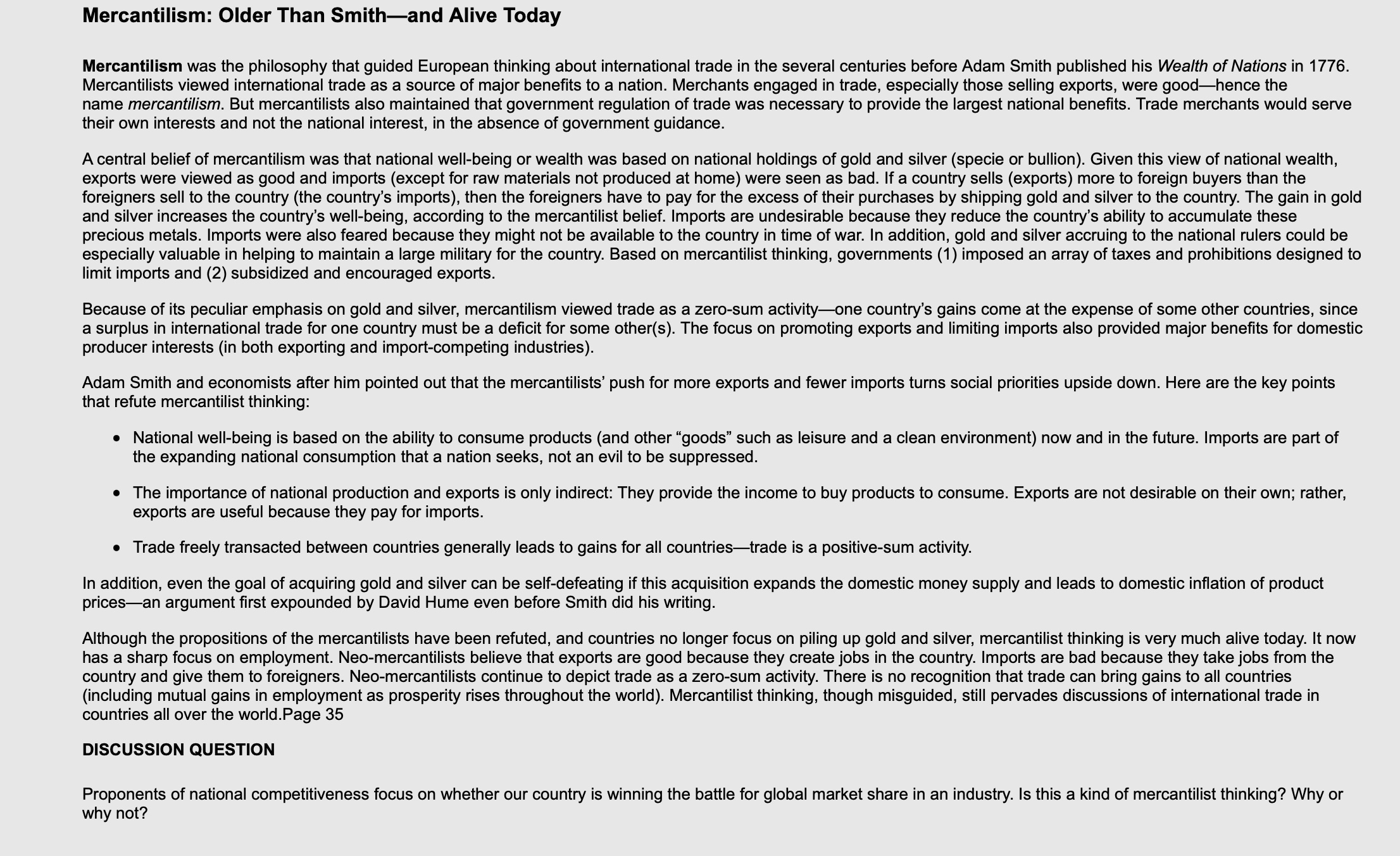Answered step by step
Verified Expert Solution
Question
1 Approved Answer
Read and answer the question; Proponents of national competitiveness focus on whether our country is winning the battle for global market share in an industry.
Read and answer the question;
- Proponents of national competitiveness focus on whether our country is winning the battle for global market share in an industry. Is this a kind of mercantilist thinking? Why or why not?
 Mercantilism: Older Than Smith-and Alive Today Mercantilism was the philosophy that guided European thinking about international trade in the several centuries before Adam Smith published his Wealth of Nations in 1776. Mercantilists viewed international trade as a source of major benefits to a nation. Merchants engaged in trade, especially those selling exports, were good-hence the name mercantilism. But mercantilists also maintained that government regulation of trade was necessary to provide the largest national benefits. Trade merchants would serve their own interests and not the national interest, in the absence of government guidance. A central belief of mercantilism was that national well-being or wealth was based on national holdings of gold and silver (specie or bullion). Given this view of national wealth, exports were viewed as good and imports (except for raw materials not produced at home) were seen as bad. If a country sells (exports) more to foreign buyers than the foreigners sell to the country (the country's imports), then the foreigners have to pay for the excess of their purchases by shipping gold and silver to the country. The gain in gold and silver increases the country's well-being, according to the mercantilist belief. Imports are undesirable because they reduce the country's ability to accumulate these precious metals. Imports were also feared because they might not be available to the country in time of war. In addition, gold and silver accruing to the national rulers could be especially valuable in helping to maintain a large military for the country. Based on mercantilist thinking, governments (1) imposed an array of taxes and prohibitions designed to limit imports and (2) subsidized and encouraged exports. Because of its peculiar emphasis on gold and silver, mercantilism viewed trade as a zero-sum activity-one country's gains come at the expense of some other countries, since a surplus in international trade for one country must be a deficit for some other(s). The focus on promoting exports and limiting imports also provided major benefits for domestic producer interests (in both exporting and import-competing industries). Adam Smith and economists after him pointed out that the mercantilists' push for more exports and fewer imports turns social priorities upside down. Here are the key points that refute mercantilist thinking: - National well-being is based on the ability to consume products (and other "goods" such as leisure and a clean environment) now and in the future. Imports are part of the expanding national consumption that a nation seeks, not an evil to be suppressed. - The importance of national production and exports is only indirect: They provide the income to buy products to consume. Exports are not desirable on their own; rather, exports are useful because they pay for imports. - Trade freely transacted between countries generally leads to gains for all countries-trade is a positive-sum activity. In addition, even the goal of acquiring gold and silver can be self-defeating if this acquisition expands the domestic money supply and leads to domestic inflation of product prices-an argument first expounded by David Hume even before Smith did his writing. Although the propositions of the mercantilists have been refuted, and countries no longer focus on piling up gold and silver, mercantilist thinking is very much alive today. It now has a sharp focus on employment. Neo-mercantilists believe that exports are good because they create jobs in the country. Imports are bad because they take jobs from the country and give them to foreigners. Neo-mercantilists continue to depict trade as a zero-sum activity. There is no recognition that trade can bring gains to all countries (including mutual gains in employment as prosperity rises throughout the world). Mercantilist thinking, though misguided, still pervades discussions of international trade in countries all over the world.Page 35 DISCUSSION QUESTION Proponents of national competitiveness focus on whether our country is winning the battle for global market share in an industry. Is this a kind of mercantilist thinking? Why or why not
Mercantilism: Older Than Smith-and Alive Today Mercantilism was the philosophy that guided European thinking about international trade in the several centuries before Adam Smith published his Wealth of Nations in 1776. Mercantilists viewed international trade as a source of major benefits to a nation. Merchants engaged in trade, especially those selling exports, were good-hence the name mercantilism. But mercantilists also maintained that government regulation of trade was necessary to provide the largest national benefits. Trade merchants would serve their own interests and not the national interest, in the absence of government guidance. A central belief of mercantilism was that national well-being or wealth was based on national holdings of gold and silver (specie or bullion). Given this view of national wealth, exports were viewed as good and imports (except for raw materials not produced at home) were seen as bad. If a country sells (exports) more to foreign buyers than the foreigners sell to the country (the country's imports), then the foreigners have to pay for the excess of their purchases by shipping gold and silver to the country. The gain in gold and silver increases the country's well-being, according to the mercantilist belief. Imports are undesirable because they reduce the country's ability to accumulate these precious metals. Imports were also feared because they might not be available to the country in time of war. In addition, gold and silver accruing to the national rulers could be especially valuable in helping to maintain a large military for the country. Based on mercantilist thinking, governments (1) imposed an array of taxes and prohibitions designed to limit imports and (2) subsidized and encouraged exports. Because of its peculiar emphasis on gold and silver, mercantilism viewed trade as a zero-sum activity-one country's gains come at the expense of some other countries, since a surplus in international trade for one country must be a deficit for some other(s). The focus on promoting exports and limiting imports also provided major benefits for domestic producer interests (in both exporting and import-competing industries). Adam Smith and economists after him pointed out that the mercantilists' push for more exports and fewer imports turns social priorities upside down. Here are the key points that refute mercantilist thinking: - National well-being is based on the ability to consume products (and other "goods" such as leisure and a clean environment) now and in the future. Imports are part of the expanding national consumption that a nation seeks, not an evil to be suppressed. - The importance of national production and exports is only indirect: They provide the income to buy products to consume. Exports are not desirable on their own; rather, exports are useful because they pay for imports. - Trade freely transacted between countries generally leads to gains for all countries-trade is a positive-sum activity. In addition, even the goal of acquiring gold and silver can be self-defeating if this acquisition expands the domestic money supply and leads to domestic inflation of product prices-an argument first expounded by David Hume even before Smith did his writing. Although the propositions of the mercantilists have been refuted, and countries no longer focus on piling up gold and silver, mercantilist thinking is very much alive today. It now has a sharp focus on employment. Neo-mercantilists believe that exports are good because they create jobs in the country. Imports are bad because they take jobs from the country and give them to foreigners. Neo-mercantilists continue to depict trade as a zero-sum activity. There is no recognition that trade can bring gains to all countries (including mutual gains in employment as prosperity rises throughout the world). Mercantilist thinking, though misguided, still pervades discussions of international trade in countries all over the world.Page 35 DISCUSSION QUESTION Proponents of national competitiveness focus on whether our country is winning the battle for global market share in an industry. Is this a kind of mercantilist thinking? Why or why not Step by Step Solution
There are 3 Steps involved in it
Step: 1

Get Instant Access to Expert-Tailored Solutions
See step-by-step solutions with expert insights and AI powered tools for academic success
Step: 2

Step: 3

Ace Your Homework with AI
Get the answers you need in no time with our AI-driven, step-by-step assistance
Get Started


